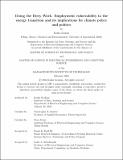Doing the Dirty Work: Employment vulnerability to the energy transition and its implications for climate policy and politics
Author(s)
Graham, Kailin
DownloadThesis PDF (9.751Mb)
Advisor
Knittel, Christopher R.
Terms of use
Metadata
Show full item recordAbstract
As the world moves away from fossil fuels, there is growing recognition of the need for policy to support a just transition of those working in carbon-intensive industries. However, little work has thoroughly investigated which communities are most vulnerable to economic disruption in the energy transition and therefore require policy support. This thesis analyzes the distribution of employment vulnerability in the United States by calculating the average "employment carbon footprint" of close-to every job in the U.S. economy at high geographic and sectoral granularity. I find that existing efforts to identify at-risk communities both in the literature and the Inflation Reduction Act exclude regions of high employment vulnerability, and thereby risk leaving these communities behind in the energy transition. I also identify significant within-sector heterogeneity in employment carbon footprints that are unexplained by fuel mix or power grid carbon intensity, and find that carbon-intensive regions tend to be more rural, less racially and ethnically diverse, less educated, and more likely to vote Republican, and that these regions often lack institutional capacity to retrain laid-off workers. This thesis also uses these new data to empirically test the salience of employment impacts for political representatives. I find that legislators from districts with carbon-intensive employment are less likely to vote in favor of climate policy, while household carbon footprints have no effect despite being correlated with public opinion on climate action; I also note the significance of the partisan divide on climate voting. Altogether, this thesis argues that just transition policy is crucial to progress action on climate change by addressing politically salient employment impact concerns; underscores the importance of proactive and continuous measures of employment vulnerability in targeting such policy; provides policymakers with the much-needed data to do so; and makes the case that such policies should be place-based and tailored to the communities they strive to serve.
Date issued
2024-02Department
Massachusetts Institute of Technology. Department of Electrical Engineering and Computer Science; Massachusetts Institute of Technology. Institute for Data, Systems, and SocietyPublisher
Massachusetts Institute of Technology